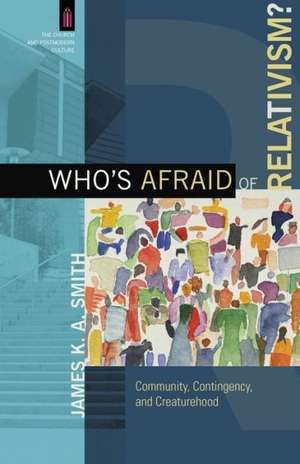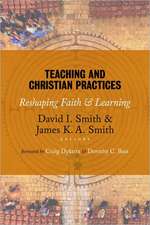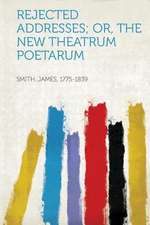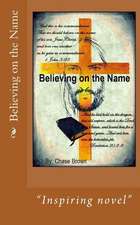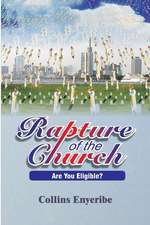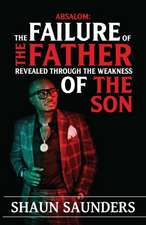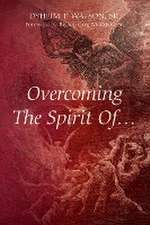Who`s Afraid of Relativism? – Community, Contingency, and Creaturehood
Autor James K. A. Smith, James Smithen Limba Engleză Paperback – 14 apr 2014
Many Christians view relativism as the antithesis of absolute truth and take it to be the antithesis of the gospel. Smith argues that this reaction is a symptom of a deeper theological problem: an inability to honor the contingency and dependence of our creaturehood. Appreciating our created finitude as the condition under which we know (and were made to know) should compel us to appreciate the contingency of our knowledge without sliding into arbitrariness. Saying "It depends" is not the equivalent of saying "It's not true" or "I don't know." It is simply to recognize the conditions of our knowledge as finite, created, social beings. Pragmatism, says Smith, helps us recover a fundamental Christian appreciation of the contingency of creaturehood.
This addition to an acclaimed series engages key thinkers in modern philosophy with a view to ministry and addresses the challenge of relativism in a creative, original way.
Preț: 147.29 lei
Nou
Puncte Express: 221
Preț estimativ în valută:
28.18€ • 29.51$ • 23.32£
28.18€ • 29.51$ • 23.32£
Carte disponibilă
Livrare economică 15-29 martie
Preluare comenzi: 021 569.72.76
Specificații
ISBN-13: 9780801039737
ISBN-10: 0801039738
Pagini: 192
Dimensiuni: 140 x 216 x 10 mm
Greutate: 0.24 kg
Editura: Baker Publishing Group – Baker Books
ISBN-10: 0801039738
Pagini: 192
Dimensiuni: 140 x 216 x 10 mm
Greutate: 0.24 kg
Editura: Baker Publishing Group – Baker Books
Textul de pe ultima copertă
A Fresh Analysis of Relativism and Pragmatism
"It is often observed that one of the most important and revealing questions you can ask someone identified as a 'thinker' is 'What are you afraid of?' Writing with clarity and great sympathy, Smith helps us see that Christian theologians have betrayed their best insights by being afraid of relativism. He helps us see that the challenge is not relativism itself but rather the epistemological concerns that produced relativism. As is usually the case with Smith's work, this book is both clear and constructive: he not only provides a clear account of the work of Wittgenstein, Rorty, and Brandom but also develops an account of why and how Christians should navigate the contingent character of our lives."
--Stanley Hauerwas, Duke Divinity School, emeritus
"In very readable and reliable expositions of Wittgenstein, Rorty, and Brandom, Smith builds an extremely attractive case philosophically for recognizing the place of contingency, finitude, and dependence in human life. From a Christian perspective, this actually reaffirms an acceptance of creaturely existence and thus of a properly orthodox version of relativism, which there is no reason to fear. A wonderful thesis."
--Fergus Kerr, University of Edinburgh
"In "Who's Afraid of Relativism?" Smith takes a beautiful risk, boldly and successfully making a case for the relevance of pragmatism for contemporary Christian self-understanding. In this remarkable book, he not only succeeds in making the difficult and enigmatic work of complicated thinkers like Wittgenstein, Rorty, and Brandom accessible to the uninitiated (no small task in itself) but also argues convincingly that the pragmatist emphases on contingency and fallibility should play a key role in a Christian understanding of humans as dependent creatures. The mutual hostility between religious thinkers and pragmatists like Rorty is well known; Smith has the wisdom to see past this impasse in a timely and radical effort to encourage contemporary Christians to think differently about themselves."
--Ronald A. Kuipers, author of "Richard Rorty"
"It is often observed that one of the most important and revealing questions you can ask someone identified as a 'thinker' is 'What are you afraid of?' Writing with clarity and great sympathy, Smith helps us see that Christian theologians have betrayed their best insights by being afraid of relativism. He helps us see that the challenge is not relativism itself but rather the epistemological concerns that produced relativism. As is usually the case with Smith's work, this book is both clear and constructive: he not only provides a clear account of the work of Wittgenstein, Rorty, and Brandom but also develops an account of why and how Christians should navigate the contingent character of our lives."
--Stanley Hauerwas, Duke Divinity School, emeritus
"In very readable and reliable expositions of Wittgenstein, Rorty, and Brandom, Smith builds an extremely attractive case philosophically for recognizing the place of contingency, finitude, and dependence in human life. From a Christian perspective, this actually reaffirms an acceptance of creaturely existence and thus of a properly orthodox version of relativism, which there is no reason to fear. A wonderful thesis."
--Fergus Kerr, University of Edinburgh
"In "Who's Afraid of Relativism?" Smith takes a beautiful risk, boldly and successfully making a case for the relevance of pragmatism for contemporary Christian self-understanding. In this remarkable book, he not only succeeds in making the difficult and enigmatic work of complicated thinkers like Wittgenstein, Rorty, and Brandom accessible to the uninitiated (no small task in itself) but also argues convincingly that the pragmatist emphases on contingency and fallibility should play a key role in a Christian understanding of humans as dependent creatures. The mutual hostility between religious thinkers and pragmatists like Rorty is well known; Smith has the wisdom to see past this impasse in a timely and radical effort to encourage contemporary Christians to think differently about themselves."
--Ronald A. Kuipers, author of "Richard Rorty"
